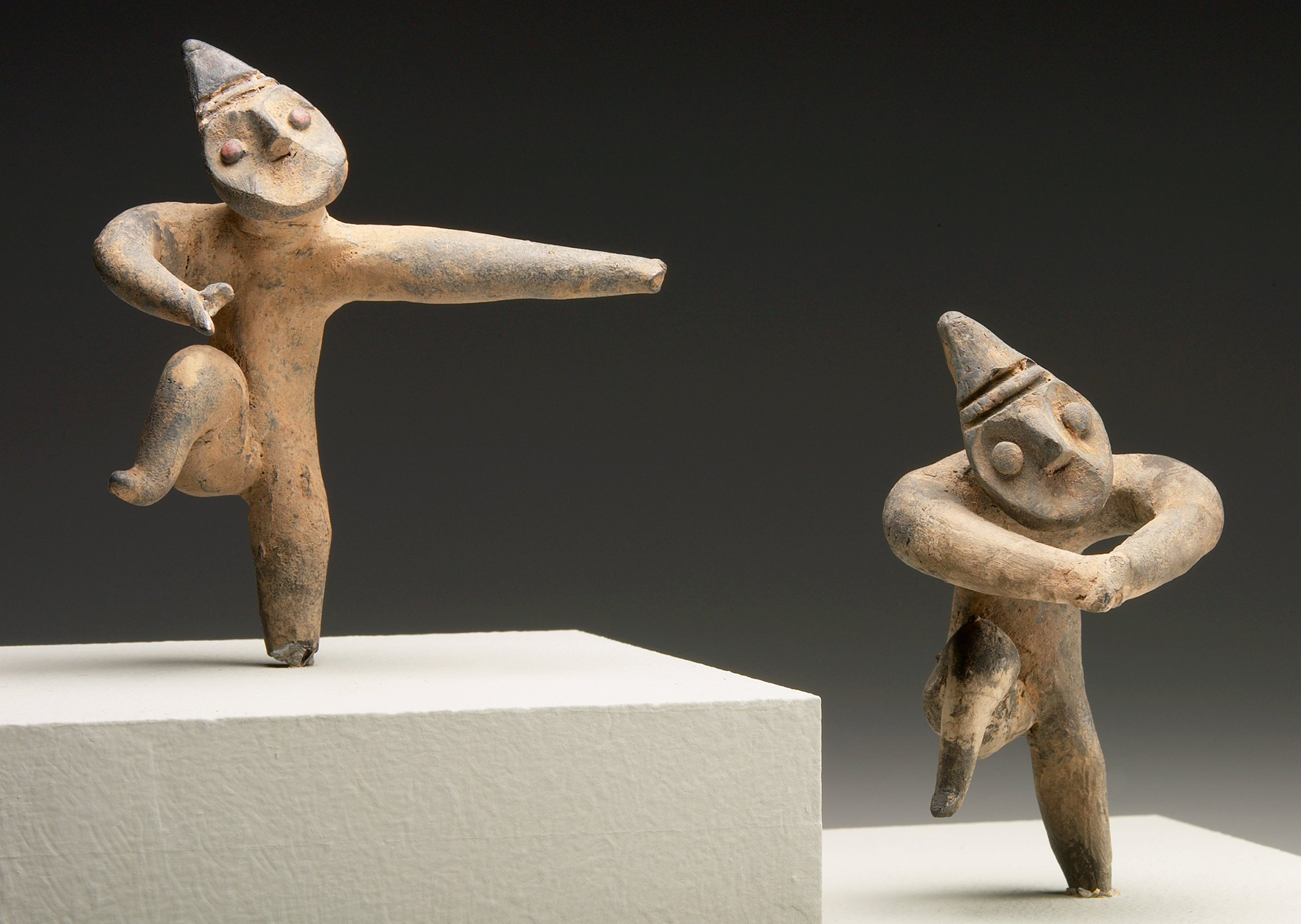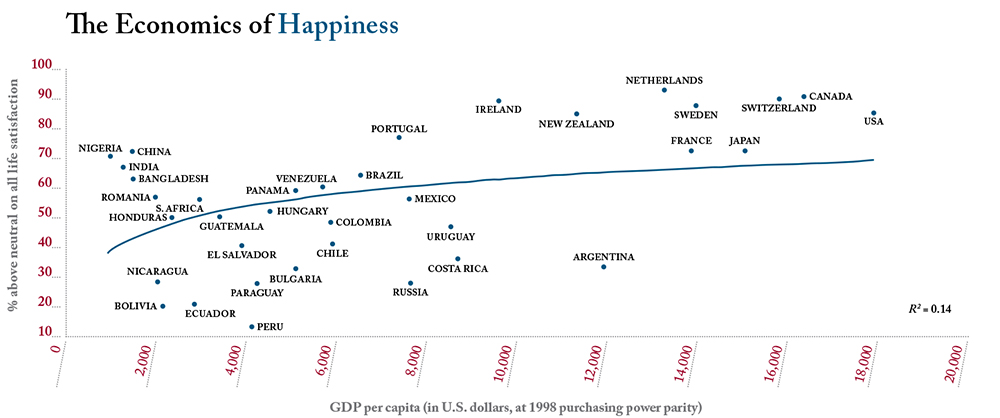
Dancing figures, c. 206 bc. The Minneapolis Institute of Art, Bequest of Alfred F. Pillsbury.
allicholy: Melancholy. Originally used by Shakespeare as a deliberate error when representing uneducated speech. “She is given too much to allicholy and musing.”—Merry Wives of Windsor, c. 1597
ananda आनन्द: Sanskrit for bliss or a divine joy that changes and continues to delight.
anhedonia: A psychological condition characterized by an inability to experience pleasure from pleasurable acts. First known use, 1887.
bliss-ninny: An overly optimistic person.
blithe: Exhibiting gladness; jocund, merry, sprightly, mirthful. From Old Norse blíðr, mild, gentle, kind. Originally referred to an outward expression of affection to others, but in Old English the word applied to the external manifestation of a happy frame of mind.
bomb happy: (British slang) A World War II expression to describe a state of near hysteria induced by bombing, which often took the form of wild elation.
buzzkill: A person who dampens enthusiasm or enjoyment; a killjoy, a downer.
cheer: A person’s mental or emotional disposition, esp. as made apparent by demeanor; mood, humor, spirits. From Anglo-Norman cheir, Latin cara, head, possibly from ancient Greek κάρα, head. “Lady Smart: ‘Come, the more the merrier.’ Sir John: ‘Aye, but the fewer the better cheer.’ ”—Jonathan Swift, Polite Conversation
dismal: (Of a character or aspect) denoting gloom or depression. From the Anglo-Norman term for French les mals jours, from Latin dies mali, evil days. In late antiquity, two days each month, called “Egyptian days,” were regarded as inauspicious. Some claimed these were anniversaries of biblical plagues in Egypt.
ebullient: (Of energy, feelings, influences) gushing forth like boiling water. From Latin ēbullient-em, present participle of ēbullīre, to boil over.

ecstasy: The state of being “beside oneself,” thrown into a frenzy or stupor. From Greek ἔκστασις, insanity, bewilderment, from ἐκστα, stem of ἐξιστάναι, to put out of place (as in the phrase ἐξιστάναι ϕρενῶν, to drive a person out of his wits). In late Greek, ἔκστασις could also refer to a withdrawal of the soul from the body or a mystic or prophetic trance.
epichairekakia ἐπιχαιρεκακία: Greek for one who takes pleasure in the pain of others.
eudemonic: Conducive to happiness. From Greek εὐδαιμονία, good demon. “The art of applying life to the maximization of well-being.”—Jeremy Bentham, Logic
euphoria: (pathology) Well-being, or the perfect ease of healthy persons, especially when the sensation occurs in a sick person. Now frequently used in nontechnical contexts: a state of cheerfulness or well-being, esp. one based on overconfidence or overoptimism. “Good Queen Victoria, / In a fit of euphoria, / Commanded Disraeli / To blow up the Old Bailey.”—W.H. Auden
felicity: The state of being happy. “Absent thee from felicity awhile, / And in this harsh world draw thy breath in pain, / To tell my story.”—Hamlet, c. 1600
fun: Lighthearted pleasure or enjoyment. From verb form meaning to cheat, cajole, or trick. Perhaps a regional variant of Middle English fon, to deceive or befool, although this sense is apparently obsolete after the Middle English period.
gaudy: (n.) Rejoicing, joy; a festival, merrymaking. From Latin gaudīum, joy. In some senses the word may represent Latin gaudē, “rejoice thou,” as used in hymns or liturgies.
gay: Happily excited, given to social pleasures. From Old French gai, happy, cheerful; akin to Old High German gāhi, quick, sudden. Also, U.S. slang, homosexual (of a person).
giddy: “Intoxicated; elated to thoughtlessness; overcome by any overpowering enticement.”—Samuel Johnson, Dictionary of the English Language
giggle: To laugh in a manner not uproarious but suggestive of foolish levity or uncontrollable amusement. Echoic; compare synonymous Dutch giggelen, German gichelen.
glad: (Of a person) cheerful, joyous, or merry in disposition. Original sense is apparently found in Old High German glat, smooth.
glee: Mirth, joy, rejoicing; a lively feeling of delight caused by special circumstances and finding expression in appropriate gestures. From Old English glēo, entertainment, music; akin to Old Norse gly, joy, and perhaps Greek χλεύη, joke.
gloat: To gaze with intense or passionate satisfaction. Apparently from German glotzen, to stare. “Never did miser gloat on his money with more delight.”—Washington Irving, “Ralph Ringwood”
jocund: Feeling, expressing, or communicating mirth or cheerfulness. From Latin jūcundus, pleasant, delightful, after jocus, joke, jest.

jolly
Of cheerful disposition or character. From Old French jolif, joli, gay, festive, lively. Friedrich Diez’ Etymological Dict. of the Romance Languages traces it to Old Norse jól, yule, or to a cognate German name (indicated by Gothic Juleis, November) for the midwinter feast of northern nations, whence “a feast” generally, but this conjecture is doubtful. The philologist Paul Meyer suggests jolif derives from Latin gaudīum, joy. Hence Jolly Roger, the pirate’s flag.
jouissance: Pleasure that is too much to bear; often felt as suffering. Per Jacques Lacan, it is “always of the order of tension, of forcing, of expenditure, even of exploit.”
jovial: Having qualities imparted by the planet Jupiter, which as a natal planet was regarded as the source of joy and happiness. From Latin joviālis, of or pertaining to Jupiter.
joystick: The control lever of an airplane; the controls of another vehicle; a small lever that can be manipulated to steer the movement of an image on a computer screen. Perhaps from British slang for penis.
Lustprinzip: German for “pleasure principle,” the psychoanalytical concept that the instinctive drive to seek pleasure and avoid tension is a basic motivating force in human life.
mechayeh: Yiddish for pleasure, enjoyment, a real joy. From Hebrew mekhayé, something that vitalizes, rejuvenates.
mirth: Gaiety as shown by laughter. “Mirth is better than fun, and happiness is better than mirth.”—William Blake, 1799
mudita मुदिता: Sanskrit for finding joy in the happiness of others; joy unconcerned with self-interest.
narcissistic elation: The prenatal state of megalomaniacal happiness; bliss experienced in an absolute withdrawal from the outside world.
osher: Hebrew for happiness, bliss, blessing. Hence osher v’osher, in happiness and wealth.
paradise: A place or region of surpassing beauty or delight, or of supreme bliss. From Greek παράδεισος, an enclosed park; of Persian origin; akin to Avestan pairi-daeza, an enclosure.
Pollyanna: An unduly optimistic person able to find happiness in disastrous situations; one who achieves happiness through self-delusion. From a character created by Eleanor Hodgman Porter (1913).
sad cake: A cake that has failed to rise, or one made without yeast.
sandboy: One employed to deliver sand to British public houses; whence, as happy as a sandboy, very happy. His happiness derived from an indulgence in liquor.

smiley face
To improve employee morale, in 1963 the State Mutual Life Assurance Company of Worcester, MA, had commercial artist Harvey Ball design the now ubiquitous black-and-yellow face. Adding the words Have a nice day, Hallmark shop owners Bernard and Murray Spain sold at least fifty million smiley badges in 1971. Also later associated with the acid house music scene of the late 1980s, esp. linked to use of MDMA, aka ecstasy or molly.
tarab طرب: Arabic for a musically induced ecstasy. Possibly the root word of troubadour.
wretch: A miserable or unfortunate person. From Old English wrecca, Old High German reccho, exile, adventurer, knight errant.
Explore Happiness, the Summer 2019 issue of Lapham’s Quarterly.